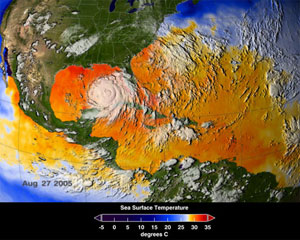National Science Board releases new hurricane research report
National Science Board releases new hurricane research report
mongabay.com
September 29, 2006
[Corrected*: October 2, 2006]
The National Science Board, a policymaking body of the National Science Foundation (NSF), has issued a new report calling for increased funding for hurricane research
A draft for public comment posted on the NSF web site urges more hurricane research to better anticipate storms and protect people and property from hurricanes while suggesting further investigation into the possible link between storm intensity and a warming climate. Recent research has suggested that warmer oceans could drive ever stronger and more frequent hurricanes.
 This image depicts a 3-day average of actual sea surface temperatures (SSTs) for the Caribbean Sea and the Atlantic Ocean, from August 25-27, 2005, as measured by the Advanced Microwave Scanning Radiometer (AMSR-E) instrument on NASA’s Aqua satellite. Areas in yellow, orange or red represents ocean temperatures of 82 degrees Fahrenheit or above. Credit: NASA/SVS |
The new draft report notes that hurricane damage is increasing — with estimated annual total losses (in constant 2006 dollars) averaging $1.3 billion from 1949-1989, $10.1 billion from 1990-1995, and $35.8 billion per year during the last 5 years — but that scientists know “know relatively little about the most important aspects of hurricanes including their internal dynamics and interactions with the larger-scale atmosphere and ocean; methods for quantifying and conveying uncertainty and mitigating hurricane impacts; associated short and long term consequences on the natural and built environment; and the manner in which society responds before, during, and after landfall.”
The report laments that “billions of tax dollars have been provided for rescue, recovery, and rebuilding after hurricanes strike” and argues that more money needs to be spent minimizing losses from hurricanes before they strike.
The top priorities identified by the report include more accurate predictions for hurricane strength and size, landfall sites, and storm surge, rainfall and inland flooding. It urges better evacuation planning and improved building techniques and requirements to make homes and roads hurricane proof. Finally the report says that more money should be spent identifying better technologies for disaster response and recovery.
At present hurricane research is conducted in a poorly organized manner by universities and multiple federal agencies, including the National Oceanic and Atmospheric Administration and NASA. The report says that better coordination is needed.
EDITOR’S NOTE: Originally this article was titled “No mention of climate change in new hurricane research report” and noted that the impact of climate change on hurricane intensity was omitted from the report.
-
Strangely missing from a new hurricane research report from the National Science Board, a policymaking body of the National Science Foundation (NSF), is any mention of climate change.
A draft for public comment posted on the NSF web site urges more hurricane research to better anticipate storms and protect people and property from hurricanes but fails to directly suggest further investigation into the possible link between storm intensity and a warming climate. Recent research has suggested that warmer oceans could drive ever stronger and more frequent hurricanes, but the current administration has moved to downplay such connections. Earlier this week the journal Nature revealed that officials at the Department of Commerce blocked the release of a report suggesting that global warming is contributing to the frequency and strength of hurricanes.
The decision to omit global warming from the draft report may be an effort to keep the board’s recommendations as uncontroversial and politically as appealing as possible in order to win support.
It turns out that the climate change-hurricane link was mentioned in the report, but that phases “climate change” and “global warming” were not used.
Page 7 of the report, found at http://www.nsf.gov/nsb, contains the following text as a recommendation:
Medium Priority: Understanding the relationship between hurricanes and climate.
The physics of hurricanes have been an important area of research, highlighting the significant role hurricanes play in the transfer of energy and water within the atmosphere and between the atmosphere and ocean. However, hurricanes currently are not resolvable in most climate models, and observational data that can link hurricane behavior to regional and global climate characteristics are limited and imperfect. Thus, research is needed to understand the complex relationships between hurricanes and climate as well as the most effective ways of using observational information. Specific emphasis should be given to increasing the presently limited skill of seasonal predictability, determining natural decadal and multi-decadal signals, understanding the role of anthropogenic impacts on hurricane size, frequency, intensity, precipitation and track, and exploring how future climate scenarios might impact tropical cyclone frequency, intensity and location. Very high resolution Earth System Models capable of resolving hurricanes will be needed to address these relationships and quantify uncertainty in a statistically reliable manner.
Our apologies for this unintentional error. Thank you to the Hurricane Task Force for the correction.
This article uses quotes and information from the National Science Board’s report “Hurricane Warning: The Critical Need for a National Hurricane Research Initiative.”







